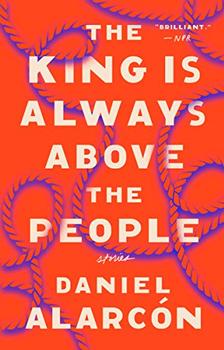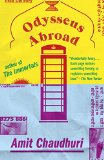Summary | Excerpt | Reading Guide | Reviews | Beyond the book | Read-Alikes | Genres & Themes | Author Bio

"Life's not complete without some kind of haunting," believes Marie, the narrator of Chloe Aridjis's stellar novel, Asunder. "There, at the very fringes of tranquility, should be at least one or two pacing wolves." This spellbinding story explores just how much this "haunting" can invade our lives and keep us in its thrall even as we try to shake free of its looming shadow and carve our own special place in the world.
Marie is a security guard at The National Gallery in London. Day after day she watches as visitors filter in and filter out, their silent rhythms and the seasons' own patterns creating in her, not boredom, but a comforting sense of calm. "I have always been more interested in being rather than becoming," Marie points out, so in that sense the museum job is a perfect fit. The reader witnesses the everyday minutiae of Marie's life - the changing of duty as the guards are moved from room to room; the exchanges with her coworkers, her daily commute home on a bus through the streets of London back to her flat where she works assiduously on elaborately crafted miniature landscapes created in egg shells.
 Yet beneath this superficial calm, the reader senses a certain dissonance. Marie's own "haunting" comes in the form of an incident that happened long ago at the National Gallery when her great-grandfather, Ted, was a museum guard. It was under his watch that Mary Richardson, a suffragette, ran a cleaver through one of the museum's most prized possessions, Diego Velazquez's Rokeby Venus. As someone who has never dreamt of breaking the rules, who has learned to accept her place in society by sheer force of inertia, this daring act has always set Marie's imagination on fire. She loves the suffragettes for who they were, fearless women defying conventional rules laid out by society. Yet Ted, who belonged to a more conservative England, was violently opposed to everything the suffragettes represented. "He was the first to admit that life as he knew it, meaning his England, would never be the same," Marie remembers. "It began with those viragos, he'd tell me, comets detached from the firmament, deviant and sharply veering, long-haired vagabond stars, hissing through the universe on their solitary paths, a tear in the social fabric, threats to the status quo." So it is that Marie is constantly torn: between being faithful to his memory and the image of the England her great-grandfather once craved, and to the strong women the suffragettes showed themselves to be.
Yet beneath this superficial calm, the reader senses a certain dissonance. Marie's own "haunting" comes in the form of an incident that happened long ago at the National Gallery when her great-grandfather, Ted, was a museum guard. It was under his watch that Mary Richardson, a suffragette, ran a cleaver through one of the museum's most prized possessions, Diego Velazquez's Rokeby Venus. As someone who has never dreamt of breaking the rules, who has learned to accept her place in society by sheer force of inertia, this daring act has always set Marie's imagination on fire. She loves the suffragettes for who they were, fearless women defying conventional rules laid out by society. Yet Ted, who belonged to a more conservative England, was violently opposed to everything the suffragettes represented. "He was the first to admit that life as he knew it, meaning his England, would never be the same," Marie remembers. "It began with those viragos, he'd tell me, comets detached from the firmament, deviant and sharply veering, long-haired vagabond stars, hissing through the universe on their solitary paths, a tear in the social fabric, threats to the status quo." So it is that Marie is constantly torn: between being faithful to his memory and the image of the England her great-grandfather once craved, and to the strong women the suffragettes showed themselves to be.
Slowly, ever so slowly, however, Marie does evolve. She is introduced to the concept of craquelure (See Beyond the Book) and is fascinated by the slowly radiating patterns of cracks that unfold in paintings over time and create ever-so-slightly newer images at every viewing. These cracks, invisible to the naked eye, are present in every painting, Marie learns. And as she looks around her, she can't help but attach this metaphor to the people she sees too. "The longer I applied what I'd just heard to the living specimens around me, imagining more and more fissures in their facades, the louder these fantasies of decomposition started to gather force," Marie says. Of course this parallel is strongest when applied to Marie herself, her own growing network of invisible "cracks" strains at her very being. Chloe Aridjis describes this resultant tension in pitch-perfect resonance. Will anything set off a final break or will Marie be able to hold these fissures together forever? The surprise lies not necessarily in the answer to that question, but in the haunting routes we must take to get there. Aridjis, who has a doctoral degree in nineteenth-century French poetry from Harvard, uses language that is very poetic. Her debut novel, Book of Clouds, set in Berlin, is beautifully magical and surreal and she brings that same mesmerizing writing to this work as well. It is to her enormous credit that she makes the daily machinations of a museum guard riveting reading. Marie's days might be outwardly repetitive and even boring but the reader sees her mind working in inventive and interesting ways.
As Marie tries to make peace with her internal struggles, there's a tightly wound energy that's apparent on every wonderful page, just waiting to leap up and hold the reader in its welcome embrace. With this novel, Chloe Aridjis has written a powerful meditation on the past, on fate and our ability to tear it all asunder. As she beautifully demonstrates, most of us are then able to craft something entirely new and wholly original from the shattered pieces that remain.
Rokeby Venus by Diego Velázquez
![]() This review
first ran in the September 18, 2013
issue of BookBrowse Recommends.
This review
first ran in the September 18, 2013
issue of BookBrowse Recommends.

If you liked Asunder, try these:

The King Is Always Above the People
by Daniel Alarcon
Published 2018
A slyly political collection of stories about immigration, broken dreams, Los Angeles gang members, Latin American families, and other tales of high stakes journeys, from the award-winning author of War by Candlelight and At Night We Walk in Circles.

by Amit Chaudhuri
Published 2016
A beguiling new novel, at once wistful and ribald, about a day in the life of two Indian men in London, each coping in his own way with alienation, solitariness, and the very art of living.
Your guide toexceptional books
BookBrowse seeks out and recommends the best in contemporary fiction and nonfiction—books that not only engage and entertain but also deepen our understanding of ourselves and the world around us.